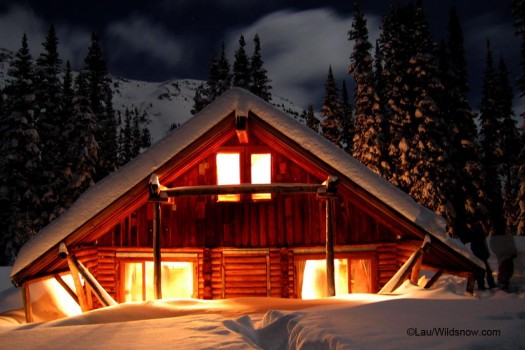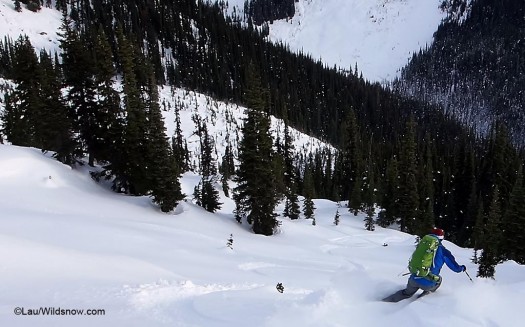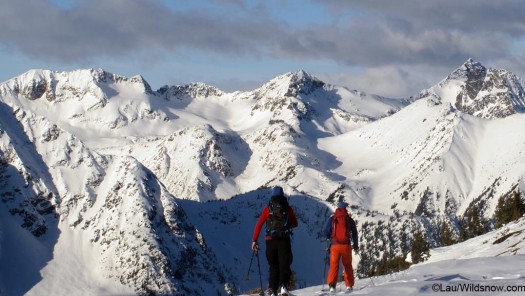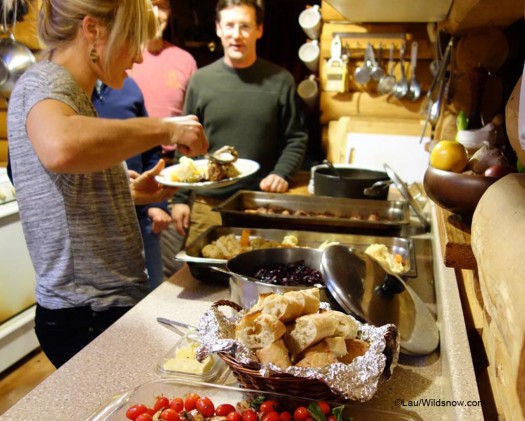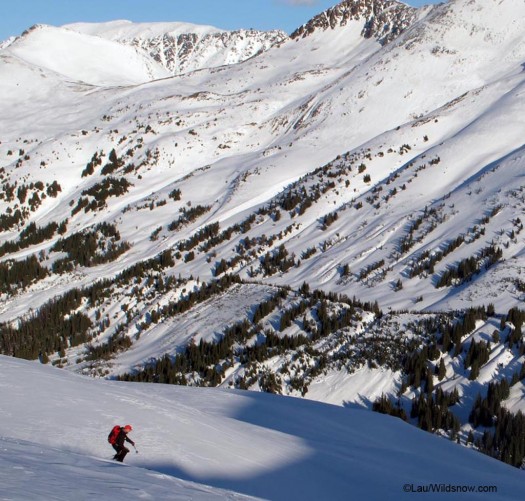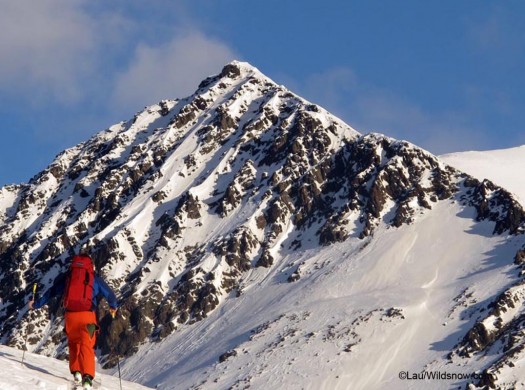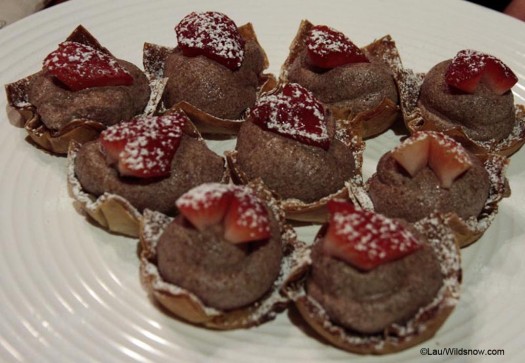Lodge based backcountry skiing in British Columbia has certain common traits. Typically you get a ride by helicopter into an otherwise hard to access hut. The lodge is surrounded by lots of skiable terrain. You settle into a routine of wake up, eat, ski, back to the hut, drink beer, eat more, yack with partners, sleep… repeat.
One seldom pointed out common feature is the long drive required to get to many of the BC interior-based backcountry huts especially if you’re based in Vancouver, Whistler, Seattle or practically anywhere on the West Coast. The vast majority of BC backcountry lodges are in the Revelstoke/Golden area. Whitecap Alpine is an exception as it is just north of Pemberton in the Sea to Sky corridor (just 1 hour north of Whistler). For West Coasties this means that you won’t have to white knuckle drive to the BC Interior on often sketchy wintry roads.
Whitecap’s relatively short commute time to a major city also means that Whitecap can offer a unique half week skiing product. 4.5 and 3.5 days of skiing (pick one or the other) means less ski-touring but it does have a certain appeal to the time deprived or to those who find the idea of a whole week of ski-touring to be intimidating. Whitecap also offers the traditional week long based touring option. Our trip was 3.5 days.
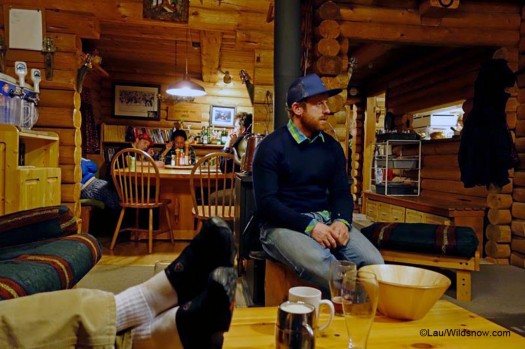
Lars Andrews and guests chilling in the Whitecap lodge. Lars started skiing when he was 5 and spent a lot of time in this lodge.
In operation for over 20 years, Whitecap Alpine has been run by the Andrews family with the same eat, ski, sleep successful mantra that draws obsessive powderhounds to British Columbia. Sharon and I talked to Lars Andrews last fall mentioning how much we wanted to return (our last trip had been in 2007). Lars pointed out that he had ski time available in January. We quickly booked.
Terrain is the key to almost everything in backcountry skiing. Whitecap Alpine has bags of it; boasting 85 square kilometers of terrain with the magical combination of east-west valleys and navigable ridgelines which gives you plenty of aspects from which to choose and long, long runs (up to 1,200 meters vertical). Weather completes the rest of the backcountry skiing roll of the dice but unfortunately conditions leading up to our mid-January 2013 trip were sub-par. Lack of snow complete with high winds from varying aspects meant that we would be working hard to find good ski conditions.
The Whitecap Alpine lodge is quintessential homespun British Columbia hand-made craftsmanship. The main lodge has seen a lot of tender loving care and is as handmade as it comes. Of course there’s the ubiquitous drying room with lots of space to hang, dry and air out gear. The main foyer and dining room is roomy and promotes hanging out with lots of couches and comfy chairs where you can chill and swap lies with your fellow ski-tourers. The kitchen dominates the rest of the main floor and was the domain of our cook for our trip.
Two bedrooms complete the rest of the main floor while there are sleeping quarters upstairs which are separated by curtains (earplugs are a necessity in ski lodges). New additions include a sauna with attached sleeping quarters and separate heated yurt out-buildings. Twelve guests can be comfortably accomodated and fed.
Our two guides were Neil Warren and Lars. Lars basically grew up here and pioneered the bulk of first descents in the surrounding area. It goes without saying that he loves the mountains and the area. We skied a lot with Neil over the week. A Rockies native, he had that unerring nose for snow and pow that all good mountain people seem to develop; to the extent that we joked that he had an AFP (Always Finding Pow) guide designation. Our cook, Kinley Aitken, rounded out the staff. Saddled with some nagging injuries that curtailed her skiing, Kinley put heart and soul into cooking.
While almost all of southwestern British Columbia languished with no decent skiable snow, the ability of Lars and Neil to find pow saved our bacon. The unholy trinity of SW, NW and NE winds conspired to destroy alpine snow while warm temperatures did a number on lower elevations. Fortunately sunny skies gave us good visibility. Our time was spent covering lots of ground and elevation hunting for snow. This meant that we saw a lot of land that most touring groups don’t get to see. Having said that, Whitecap’s terrain is enormous and we just saw little snippets.
The lodge itself is in a valley at about 1850m elevation with McGillivray Ridge to the south and Standard Ridge to the north. Almost all tours start with the climb to the ridgelines then continue on to surrounding peaks and end with a descent. We ended up using natural terrain features (ridges, treed slopes, etc.) to find pockets of protected snow. To illustrate the breadth of the terrain we easily split groups depending on what we wanted to ski that day and rarely saw the other ski-tourers. On our last day, because stability was so good Lars led a group up to McGillivray Peak to bag the summit. On the other side of the valley we skied laps of pow with Neal and watched our friends wallow up waist-deep facets then ski 1000m descents back to valley floor!
With almost every day averaging between 1500 – 1800m of climbing and 15 – 18kms of distance we most definitely earned our turns. One can only imagine how much pow can be slayed given optimal conditions.
To summarize, we had unusually fantastic stability, fast travelling conditions, (mostly) clear skies, variable snow that challenged us to hunt for pow, moderate temperatures and little wind. We skied a ton. We ate great food. We had a fantastic time. The ski quality was beyond what we expected given the weather leading up to the trip — we attribute that to the AFP-skills of the guides.
Dates and pricing availability for Whitecap are here. Based on a six person group (guide, cook) we paid approximately $1050 per person. For information about more ski touring lodges also check out the Backcountry Lodges of BC Association.
Guest blogger Lee Lau is an avid skier and outdoorsman embarking on many adventures with his loving, and sometimes concerned wife, Sharon. He has over 15 years of experience skiing, ski-touring and dabbles in mountaineering. In the “off-season” he is occasionally found working in his day job as an intellectual property lawyer when he is not mountain biking. As a resident of Vancouver, British Columbia, Lee’s playground extends mainly to Western Canada, including South West B.C. and the Selkirks.

